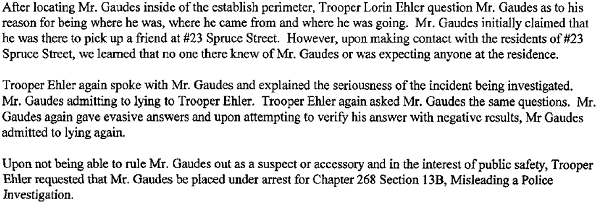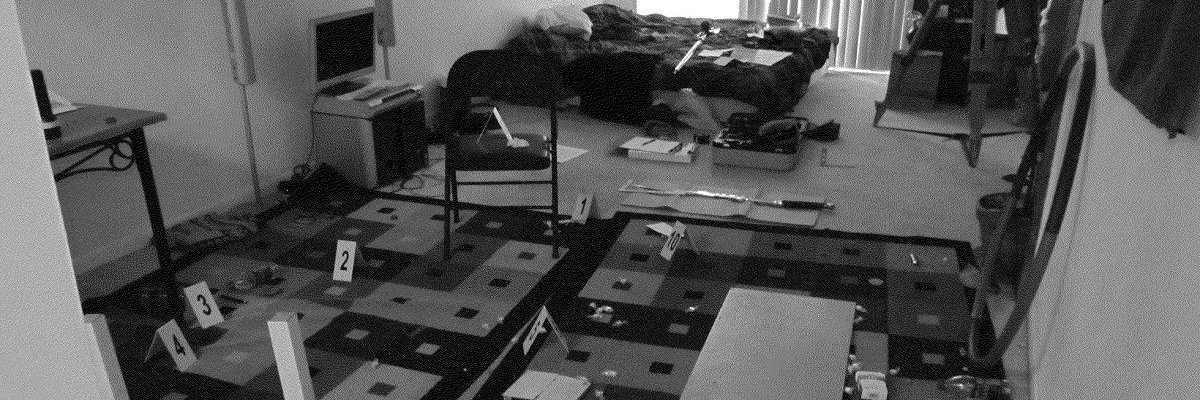A version of this article originally appeared on the Bay State Examiner
As officers from dozens of law enforcement agencies descended on Watertown, Massachusetts during the manhunt for Dzhokhar Tsarnaev in the early hours of April 19, 2013, at least three people near the scene of the shootout were truly in the wrong place at the wrong time. They were each spotted by officers and, for different reasons, ended up spending the night behind bars.
The events that occurred that day, and indeed throughout the hunt for the perpetrators of the Boston Marathon bombings, remain a black box. We know the carnage at the Marathon that started the hunt for the perpetrators, and we know that the pursuit culminated in a shootout, Tamerlan Tsarnaev’s death, a house-by-house search for Dzhokhar, and his eventual capture. But what transpired between the time of the attack on Tuesday and the arrest of the younger of the two brothers Friday evening is still a mystery.
There are at least two publicly known accounts of individuals who, largely because of their ethnic background, became suspected of being involved in the bombing. Abdulrahman Alharbi, a Saudi national who happened to be near the finish line when the bombs went off, suffered lacerations to his legs when the second bomb ripped through his jeans. Alharbi was quickly ushered to an ambulance where three police officers accompanied him because they suspected him of participation in the attacks.
Curious if anyone else had a similar experience, I filed several public records requests with different law enforcement agencies for records of arrests or detentions related to the bombings. Boston Police and Cambridge Police claimed to have no responsive documents.
The FBI similarly claimed to have no responsive documents on my initial request but rejected a second request – one of which was not submitted until the end of Dzhokhar Tsarnaev’s trial – claiming that the records “could reasonably be expected to interfere with enforcement proceedings” if released to the public.
On the other hand, the Watertown Police Department responded with the arrest reports for three people.
Daniel Gaudes, who was 23-years-old and lived in Newton at the time of his arrest, was charged with witness intimidation after he was approached by officers within the perimeter set up during the search for Dzhokhar. According to the narrative attached to the arrest report, after being questioned about his reason for being in the area, “Mr. Gaudes initially claimed that he was there to pick up a friend at #23 Spruce Street. However, upon making contact with the residents of #23 Spruce Street, we learned that no one there knew of Mr. Gaudes or was expecting anyone at the residence.”
He was placed under arrest for felony “misleading a police investigation” for allegedly lying to a police officer.

According to the supplemental narrative, however, Gaudes claimed he became curious upon spotting police lights, but was spooked when approached by investigators and tried to come up with an innocuous alibi.

Arnak Khachatryan, who was 35-years-old at the time, was taken into protective custody by the Watertown police. According to the supplied narrative, Khachatryan was detained by Boston police at around 4 a.m. on April 19, 2013, after he was allegedly spotted running on Dexter Avenue toward his home where his wife and kids were.
He was taken into custody after an officer noticed he “had very water [sic] and red eyes, he was disheveled, his speach [sic] was very slurred, and I could smell a strong odor of an alcoholic beverage on his breath.”

His home on Dexter Avenue was just a few houses away from the scene of the shootout between the Tsarnaevs and law enforcement, which occurred at the intersection of Laurel Street and Dexter Avenue.
But the wildest, and perhaps most upsetting, arrest during the manhunt saga took place at Monro Muffler & Brake Service at 390 Arsenal Street around noon. Arzouman Nrgeian, then a 59-year-old resident of Watertown, was detained and suspected of concealing explosives on his body, according to the narrative submitted by Lt. Christopher M. Munger. He was “contacted” at the “Arsenal St. perimeter” and allegedly refused to follow the officers’ commands. Police even called in a bomb squad and used multiple robots to examine Nrgeian for explosives.

It turns out that Nrgeian, of Armenian descent, was simply buying cigarettes and didn’t know English. Nevertheless, he was arrested and charged with disorderly conduct.

What exactly Nrgeian was doing that prompted such a dramatic response remains unknown. His arrest was covered by WickedLocal.com at the time, which reported that “Nrgeian wasn’t compliant with officers during the shelter in place order and was placed under arrest,” leaving us to guess how someone could comply with orders given in a language they don’t understand.
We still don’t know the whole story of what happened that day, and probably never will, but the information we do have suggests that law enforcement agents from within 200 miles of Boston poured into the city, creating a disorganized, overzealous mob.
These arrest narratives provide an uncomfortable reminder that this sort of ends-justify-the-means policing – where everyone is treated like a terrorist – has real consequences for real people.
Read through the full reports on the request page, or embedded below:
Image by A Name Like Shields Can Make You Defensive via Flickr and is licensed under CC BY-SA 2.0


